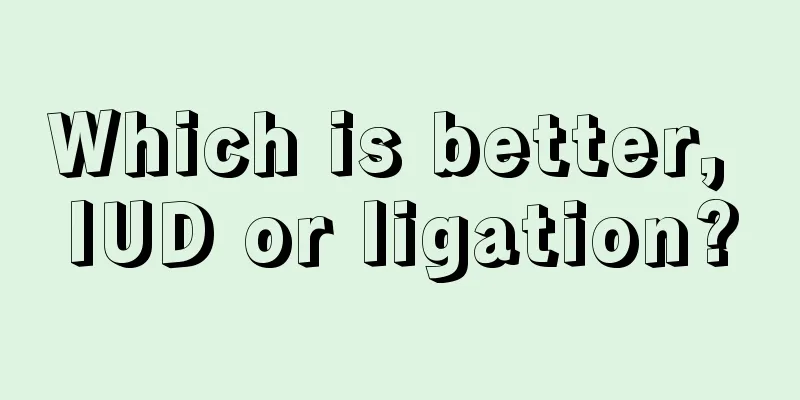Talking about "intestinal" knowledge, pooping after eating is not necessarily as simple as "straight intestine"

|
Going to the toilet right after eating, going to the toilet when nervous... These behaviors are jokingly called "straightforwardness". Some people say that "straightforwardness" proves good digestion, while others say that "straightforwardness" is a disease. So is "straightforwardness" a normal physiological phenomenon or a disease? In fact, if only one of the above symptoms occurs, most of them are normal physiological phenomena. If it is often accompanied by abdominal pain and/or diarrhea, and after going to the hospital for various laboratory tests and imaging tests, no substantial lesions are found, it is considered that irritable bowel syndrome (IBS) has occurred. 1. Physiological phenomena 1. Caused by visceral hypersensitivity After eating, the chyme stimulates the gastrointestinal tract and causes it to move, which is a normal physiological phenomenon. Since the sensitivity of each person's gastrointestinal mucosa is different, and some people are more sensitive, after eating, the gastrointestinal tract moves faster and stronger, which will cause the phenomenon of "rectum". In addition, when the human body is under stress, the excitement of the sympathetic nerves will also stimulate the gastrointestinal tract to speed up motility. If the internal organs are also more sensitive to it, the above-mentioned symptoms will appear. 2. Food factors The human body has different tolerance and acceptance for each type of food. This is common in people with lactose intolerance. After eating foods containing lactose, the gastrointestinal tract cannot tolerate lactose, which speeds up its peristalsis. Some people may not know what foods they are intolerant to (such as high-fat foods, high-protein foods, etc.), but continue to eat or eat a lot of them, which may also cause defecation immediately after eating. 2. Pathological phenomena In addition to physiological phenomena, if long-term bowel movements are accompanied by changes in stool characteristics, repeated abdominal pain, bloating and other discomfort symptoms, you need to be alert to IBS ! After the promulgation of the Rome IV criteria in 2016, China updated the IBS expert consensus opinion - "2020 Chinese Expert Consensus on Irritable Bowel Syndrome", which mentioned that " IBS is characterized by abdominal pain, bloating or abdominal discomfort as the main symptoms, which are related to defecation or accompanied by changes in bowel habits such as frequency and/or stool characteristics. Through routine clinical examinations, no organic diseases that can explain these symptoms have been found ." 1. Etiology and pathogenesis The pathophysiological mechanism of IBS has not yet been fully elucidated. It is currently believed that it is an abnormal gut-brain interaction caused by the combined action of multiple factors . (1) Dietary factors Dietary factors can induce or aggravate IBS symptoms. Most studies have shown that food intolerance is a major risk factor for IBS, and the number of foods that induce gastrointestinal symptoms is positively correlated with the severity of IBS symptoms. (2) Disease factors Meta-analysis of foreign studies has shown that intestinal infection is an important factor in the development of IBS , and about 10% of intestinal infections will develop into IBS (OR=7.3, 95%CI 4.8~11.1). Prospective studies in China have confirmed that the incidence of IBS in patients with a history of intestinal infection is 4 times higher than that in patients without a history of intestinal infection (OR=2.39). (3) Mental factors Mental factors can interact with the peripheral and/or central nervous, endocrine, and immune systems to regulate the severity of symptoms. Therefore, long-term mental stress, depression, tension, anxiety, etc. can easily induce or aggravate IBS symptoms . Among them, depression and anxiety disorders are significant risk factors for IBS, with an incidence rate of 40% to 60% in IBS patients. 2. Diagnosis At present, the diagnosis of IBS in my country is mainly based on the Rome IV criteria, which are formulated in combination with the actual clinical situation in my country. The criteria are as follows: Recurrent abdominal pain, bloating, and discomfort, and any two or more of the following: 1|Related to defecation 2|Accompanied by changes in bowel movement frequency 3|Accompanied by stool characteristics or appearance Symptoms occurred for at least 6 months before diagnosis and met the above diagnostic criteria in the past 3 months. At the same time, alarm signs were excluded, including age >40 years, blood in stool, positive fecal occult blood test, nocturnal bowel movements, anemia, abdominal mass, ascites, fever, unintentional weight loss, family history of colorectal cancer and inflammatory bowel disease. 3. Treatment There is no cure for IBS, and the main treatment goal is to improve symptoms and improve quality of life. At the same time, since each patient's personal situation, disease severity, and symptoms are different, an individualized comprehensive treatment strategy is required . (1) Drug treatment (Figure 1) Figure 1 Schematic diagram of drug treatment classification for irritable bowel syndrome Commonly used medications for IBS include: ① Drugs that act on the peripheral nervous system, including antidiarrheal agents (such as polyethylene glycol), GC-C agonists (such as linaclotide), bile acid regulators (such as chenodeoxycholic acid), chloride channel activators (such as lubiprostone), etc. ② Drugs that act on the whole body, including antispasmodics (such as pinaverium bromide), antidepressants (such as doxepin hydrochloride), opioids (such as loperamide), serotonin reuptake inhibitors (such as fluoxetine), etc. (2) Non-drug treatment ① A low FODMAP diet is recommended on a daily basis, that is, reducing the intake of fermentable oligosaccharides, disaccharides, monosaccharides and polyols. At the same time, avoiding factors that induce or aggravate symptoms and adjusting lifestyle (Figure 2) are all beneficial to improving IBS symptoms. Figure 2 Adjusting your lifestyle ② Psychological cognitive behavioral therapy is an essential part of IBS treatment. A controlled study involving 436 IBS patients found that standard cognitive behavioral therapy improved gastrointestinal symptoms more than psychological education (61%* vs.* 43%), and the effective absolute risk measurement index was 4 (95% CI 3~9). In short, the so-called "straight intestine" in life may be caused by physiological factors or pathological factors. You can first improve it by properly adjusting your diet and lifestyle. If there is no improvement or the symptoms worsen, and if there are other symptoms, it is recommended to go to the hospital for examination to avoid delaying the disease and affecting your health and quality of life. References [1] Chinese Society of Gastroenterology, Gastrointestinal Functional Diseases Collaborative Group, Chinese Society of Gastroenterology, Gastrointestinal Motility Group. 2020 Chinese Expert Consensus on Irritable Bowel Syndrome [J]. Chinese Journal of Gastroenterology, 2020, 40(12): 803-818. Text: Feng Xiwen |
>>: Do you have a lot of tears and eye mucus? You may have this eye disease
Recommend
What kind of fillings are there for dumplings? Do meat dumplings need to be cooked in 10 minutes?
Most dumplings are stuffed with vegetables and me...
What to do if you get a cold and your lower abdomen is swollen
If you do not pay attention to keeping warm in da...
Does the disappearance of ovulation pain mean that ovulation has taken place?
Important reminder: The different body materials ...
Bleeding in stool forty days after delivery
Everyone knows that postpartum confinement is ver...
What causes bleeding during sex?
During sexual intercourse, women may experience v...
Caesarean section six months of pregnancy successful
It takes a longer time for women who have had a c...
Symptoms of early uterine prolapse
Uterine prolapse is a common disease among women,...
Doctors from Peking Union Medical College say | To deal with eczema, dermatologists from Peking Union Medical College offer four tips
The summer heat rash and mosquito bites still hav...
What should I do if I get acne on my face during my menstrual period?
Acne on the face has a great impact on many femal...
What should I do if there is water in the fallopian tube? How to treat hydrosalpinx
Hydrosalpinx often causes fallopian tube blockage...
How do you know if the amniotic fluid is infected?
Pregnancy is both a difficult and a happy thing f...
How long does a normal abortion take?
For women who have an unexpected pregnancy, if th...
Will people who don’t usually catch colds have stronger immunity?
Are there these two types of people around you? O...
Can I get eyebrow tattoo if I am pregnant during the month?
If you get pregnant during the month of eyebrow t...
Will there be any reaction on the seventh or eighth day of pregnancy?
When a woman is pregnant soon, the body may not h...









